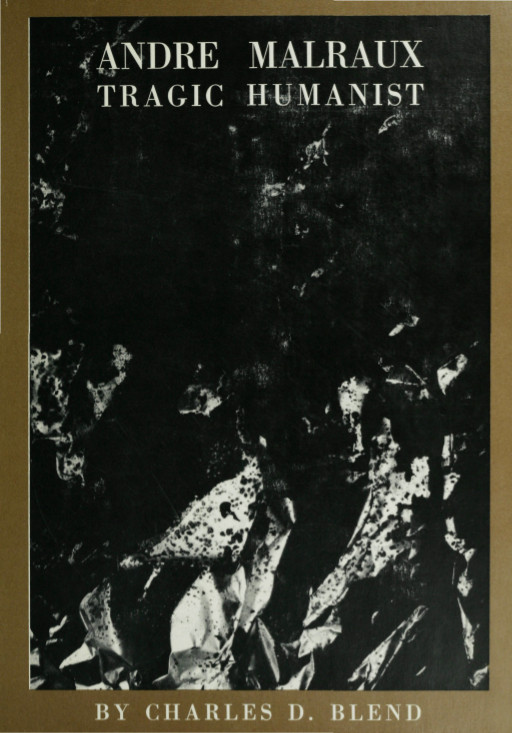Charles D. Blend: André Malraux: Tragic Humanist (1963)
Filed under book | Tags: · art, biography, communism, humanism, poetry, politics

“The dominant question arising from the unparalleled inhumanity of the mid-twentieth century, André Malraux has suggested “Is man dead?” Yet, for him, to pose the question is to answer it, for man proves his greatness, not by affirming it, but by questioning. It is by a mise en question of the universe that man rises above it.
This interpretation, long central to Malraux’s thinking, brings with it a number of difficulties. Previous concepts of man have produced an image, an ideal, toward which man could orient himself, and have presupposed a culture that had a role in the scheme of things. With a vision of man based on questioning rather than affirmation, it becomes impossible to preconceive an image of him or to visualize a form for human culture, and traditional humanism passes from the picture.
For Malraux, however, man has something that is greater than a preconceived image of himself: consciousness or awareness. To replace the images of man that have been destroyed or invalidated, Malraux calls for the will to grasp the greatest possible consciousness of what it is to be a man, coupled with the will to absolutely free discovery. Combining these values, Malraux suggests, produces a culture that is a human adventure, an advehture in freedom. Humanism is still possible, but it is a tragic humanism—humanism, because man knows his will and his starting point; tragic, because he can never know where he is going. Man can lead a dignified and fruitful existence given the will to struggle endlessly with the unknown.”
Publisher Ohio State University Press, 1963
255 pages
Richard Wolin: The Wind from the East: French Intellectuals, the Cultural Revolution, and the Legacy of the 1960s (2010)
Filed under book | Tags: · 1960s, communism, cultural revolution, france, history, left, literature, maoism, marxism, philosophy, politics, resistance, situationists, structuralism
/cover.jpg)
“Michel Foucault, Jean-Paul Sartre, Julia Kristeva, Phillipe Sollers, and Jean-Luc Godard. During the 1960s, a who’s who of French thinkers, writers, and artists, spurred by China’s Cultural Revolution, were seized with a fascination for Maoism. Combining a merciless exposé of left-wing political folly and cross-cultural misunderstanding with a spirited defense of the 1960s, The Wind from the East tells the colorful story of this legendary period in France. Richard Wolin shows how French students and intellectuals, inspired by their perceptions of the Cultural Revolution, and motivated by utopian hopes, incited grassroots social movements and reinvigorated French civic and cultural life.
Wolin’s riveting narrative reveals that Maoism’s allure among France’s best and brightest actually had little to do with a real understanding of Chinese politics. Instead, it paradoxically served as a vehicle for an emancipatory transformation of French society. French student leftists took up the trope of “cultural revolution,” applying it to their criticisms of everyday life. Wolin examines how Maoism captured the imaginations of France’s leading cultural figures, influencing Sartre’s “perfect Maoist moment”; Foucault’s conception of power; Sollers’s chic, leftist intellectual journal Tel Quel; as well as Kristeva’s book on Chinese women–which included a vigorous defense of foot-binding.
Recounting the cultural and political odyssey of French students and intellectuals in the 1960s, The Wind from the East illustrates how the Maoist phenomenon unexpectedly sparked a democratic political sea change in France.”
Publisher Princeton University Press, 2010
ISBN 0691129983, 9780691129983
400 pages
Video interview with the author: Platypus.
Reviews: Scott McLemee (The National), Julian Jackson (The Guardian), David Gress (The Wall Street Journal).
PDF (updated on 2023-4-25)
Comments (2)Lucio Magri: The Tailor of Ulm: Communism in the Twentieth Century (2009/2011)
Filed under book | Tags: · cold war, communism, history, italy, left, politics

A fascinating analysis and account of the decline and fall of Western communism by a participant observer.
Twenty years have passed since the Italian Communists’ last Congress in 1991, in which the death of their party was decreed. It was a deliberate death, accelerated by the desire for a “new beginning.” That new beginning never came, and the world lost an invaluable, complex political, organizational and theoretical heritage.
In this detailed and probing work, Lucio Magri, one of the towering intellectual figures of the Italian Left, assesses the causes for the demise of what was once one of the most powerful and vibrant communist parties of the West. The PCI marked almost a century of Italian history, from its founding in 1921 to the partisan resistance, the turning point of Salerno in 1944 to the de-Stalinization of 1956, the long ’68 to the “historic compromise,” and to the opportunity—missed forever—of democratic transformation.
With rigor and passion, The Tailor of Ulm merges an original and enlightening interpretation of Italian communism with the experience of a militant “heretic” into a riveting read—capable of broadening our insights into contemporary Italy, and the twentieth-century communist experience.
First published as Il Sarto di Ulm, il Saggiatore SPA, Milan, 2009
Translated by Patrick Camiller
Publisher Verso, 2011
ISBN 1844676986, 9781844676989
434 pages
review (Donald Sassoon, The Observer)
review (John Green, review31)

